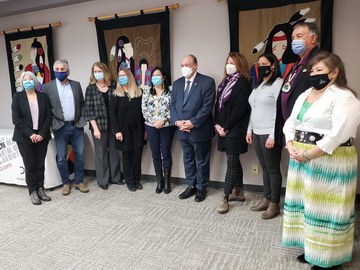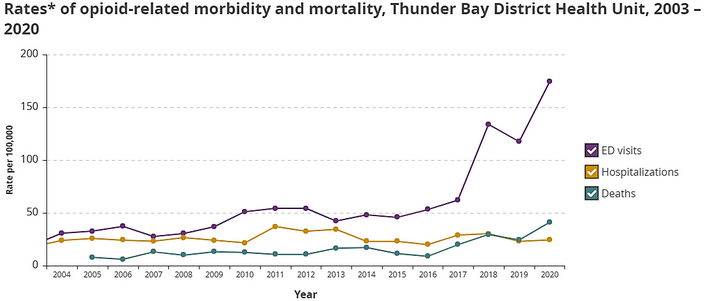News
Ontario Expanding Addictions Services in Thunder Bay
Date: 2022-03-14
The Ontario government is investing over $3.8 million through the new Addictions Recovery Fund to immediately enhance access to addictions treatment supports in Thunder Bay. This funding will be provided to St. Joseph’s Care Group and Dilico Anishinabek Family Care to expand access to a total of 34 new addictions treatment beds and help hundreds of Ontarians in Thunder Bay and the surrounding region access specialized addictions treatment.
“Our government remains steadfast in our work to provide Ontarians in the North with access to safe and effective mental health and addictions services as close to home as possible,” said Michael Tibollo, Associate Minister of Mental Health and Addictions. “Investing in mental health and addictions services in Thunder Bay is just one more way our government is continuing to support vulnerable populations across the province with high-quality mental health and addictions care that addresses their unique needs on their journey to recovery.”
St. Joseph’s Care Group is a recognized leader in Northwestern Ontario, providing rehabilitative care, support for seniors, and mental health and addictions services. Funding through the new Addictions Recovery Fund will provide access to 10 new addictions treatment beds and four new withdrawal management beds.
Dilico Anishinabek Family Care provides a range of responsive individual, family and community programs and services for the complete life journey of all Anishinabek people and this funding will support 20 new supportive treatment beds.
Studies have shown that opioid-related deaths surged by 79 per cent during the first two waves of the pandemic, with rates being three times higher in Northern Ontario. To meet the demand for treatment, the new Addictions Recovery Fund will support almost 400 new addictions treatment beds across the province, helping to stabilize and provide care for approximately 7,000 clients per year. This includes clients in northern, rural and Indigenous communities. Addictions Recovery Fund investments in other addictions services and supports across the province include:
- Eight new Youth Wellness Hubs offering developmentally tailored primary care and mental health and addictions treatment for youth ages 12 to 25;
- Two new Mobile Mental Health Clinics to provide a full suite of mental health and addictions services directly to individuals living in remote, rural and underserved communities;
- Three new police-partnered Mobile Crisis Response Teams to support individuals in a mental health or addictions crisis;
- Support for Indigenous-led land-based healing services; and
- Additional community supports including day/evening intensive treatment, mild to moderate intensive treatment, and after-care programs.
“Every year, more than one million people in Ontario experience a mental health or addictions challenge,” said Christine Elliott, Deputy Premier and Minister of Health. “That’s why our government is continuing to fulfill our commitment of making mental health and addictions a priority by investing in targeted addictions services.”
Quick Facts
- The $90 million Addictions Recovery Fund complements, but is separate from, the $175 million Roadmap to Wellness investment announced in the 2021 Budget, and is being invested over three years. Investments of $7.2 million are being made in 2021-22, and $41.39 million in each of 2022-23 and 2023-24.
- As part of Budget 2021, Ontario is investing $32.7 million in new annualized funding for targeted addictions services and supports, including treatment for opioid addictions. This funding is part of the government’s commitment to invest $3.8 billion over 10 years to implement Roadmap to Wellness, Ontario’s comprehensive plan to build a modern, connected, and high-quality mental health and addictions system centred around the needs of individuals and their families.
- As part of this $32.7 million investment in annualized funding, the Ontario government committed $18.8 million towards bed-based addictions services for adults and youth who need intensive supports. This investment included $7.85 million for a total of 90 new treatment beds determined through an Ontario Health-led provincial call for applications in summer/fall 2021.
- In 2020-2021, in response to the COVID-19 outbreak, the province invested up to $194 million in one-time emergency funding for mental health and addictions services.
- The Ontario government is investing $2.5 million in Breaking Free Online, an innovative therapy tool that makes it faster and easier for Ontarians to access safe and effective addictions supports. Ontarians can register at www.breakingfreeonline.ca and have free access to programming and resources for two years. Mental health and addictions service providers can also register their patients for this service.
- Visit COVID-19: Support for People to find information about the many available, confidential, and free mental health and addictions services and supports for Ontarians of all ages.
Quotes
"Addictions have taken a terrible toll on our community and many lives have been lost and families devastated. I want to thank the Province for today’s announcement of new treatment, withdrawal and supportive treatment beds. It is welcome news and an important first step in dealing with a crisis that is impacting so many communities, citizens and families right across Ontario and across Canada."
- Bill Mauro
Mayor, City of Thunder Bay
"This new investment will provide a safe space in the local continuum of addictions treatment for Indigenous young people to address personal difficulties related to substance misuse. They will be able to engage with other young people transitioning in to adulthood in a supportive living environment that is inclusive and provides other on-site support services such as cultural and land-based activities, life skill building, coping skill development; as well as access to individual and group counselling, and supports with entry to education and employment opportunities."
- Darcia Borg
Executive Director, Dilico Anishinabek Family Care
"Providing addiction treatment services that are geared for young people entering adulthood is a priority to our communities. Entering adulthood is a critical time in a young person’s life. Making available as many protective life factors for young people will enhance their start into adulthood."
- Chief Theresa Nelson
President of the Board of Directors, Dilico Anishinabek Family Care
"There is urgent and immediate need in Thunder Bay for people living with addiction, and the pandemic has added to what can only be described as a crisis. Today’s investment of $1.1 million through the Addictions Recovery Fund recognizes and helps meet that need. With our partners, we will ensure that funding is put to use by expanding access to care right now, and adding new withdrawal management and addictions beds. It means we can offer more to people who are struggling with addictions and their families."
- Kelli O’Brien
President & Chief Executive Officer, St. Joseph’s Care Group
"Our leadership, faced with the devastating impacts that addictions have on children and families, continue to work to enhance the support available for our people. Fort William First Nation celebrates the announcement of additional resources to help support those struggling with addictions. This additional support will be vital in our effort to provide young people a safe space to access culturally appropriate programs and services."
- Chief Peter Collins
Fort William First Nation
"On behalf of the Thunder Bay District Mental Health and Addiction Network, a network representing numerous organizations dedicated to providing mental health and addiction services, we are so pleased about the announced investments that will continue to build and improve the continuum of services for the people we serve."
- Diane Walker and Nancy Chamberlain
Co-Chairs, Thunder Bay District Mental Health and Addiction Network
Additional Resources
- Protecting Our Progress
- Ontario Launches New Addictions Recovery Fund
- Ontario Expanding Support for Addictions Treatment Throughout the Province
- 2021 Budget - Ontario’s Action Plan: Protecting People’s Health and Our Economy
- Visit Ontario’s COVID-19 vaccine web page to view the latest provincial data and information on COVID-19 vaccines.
- Visit Ontario’s COVID-19 information website to learn more about how the province continues to protect the people of Ontario from the virus.
- For public inquiries call ServiceOntario, INFOline at 1-866-532-3161 (Toll-free in Ontario only)
Backgrounder - Addictions Recovery Fund
On February 11, 2022, Ontario’s Ministry of Health announced expanded addictions services and supports across the province through the new Addictions Recovery Fund, a three year program to immediately expand addictions services and increase the number of treatment beds across the province.
In consultation with the members our region’s planning networks, a proposal was developed to expand and enhance addiction bedded programs in response to urgent needs identified within the city of Thunder Bay and surrounding region.
St. Joseph’s Care Group is named as the lead agency on the proposal, in partnership with Dilico Anishinabek Family Care, Canadian Mental Health Association Thunder Bay, NorWest Community Health Centres, Crossroads Centre, and North of Superior Programs.
Announced by Michael Tibollo, Associate Minister of Mental Health and Addictions, the proposal garnered $1.1 million dollars, and will support the following:
Withdrawal Management
| Agency | Net New Beds | Total Annual Costs |
|---|---|---|
| St. Joseph’s Care Group – Balmoral Centre | 2 | $237,728 |
| Dilico Anishinabek Family Care | 2 | $116,480 |
| Agency | Enhanced Beds | Total Annual Costs |
|---|---|---|
| Canadian Mental Health Association Thunder Bay | 6 | $177,000 |
Addictions Treatment
| Agency | Net New Beds | Total Annual Costs |
|---|---|---|
| St. Joseph’s Care Group – Sister Margaret Smith Centre | 4 | $205,075 |
| Dilico Anishinabek Family Care | 4 | $109,200 |
| NorWest Community Health Centres | 2 | $138,733 |
Supportive Treatment
| Agency | Enhanced Beds | Total Annual Costs |
|---|---|---|
| Crossroads Centre | 4 | $9,272 |
Transportation
| Agency | Total Annual Costs |
|---|---|
| North of Superior Programs | $32,016 |
Addictions Services Fund is a 3 year investment (2021-22, 2022-23, and 2023-24)
Quick Facts about the Addictions Recovery Fund
- The $90 million Addictions Recovery Fund complements, but is separate from, the $175 million Roadmap to Wellness investment announced in the 2021 Budget, and is being invested over three years.
- Studies have shown that opiod-related deaths surged by 79% during the first two waves of the pandemic, with Ontarians at risk of overdose facing significant barriers to accessing treatment.
- This investment will support 396 new addictions treatment beds for adults who need intensive supports, helping to stabilize and provide care for approximately 7,000 clients per year.
Quick Facts about the Need in Thunder Bay and District
As noted in Thunder Bay Drug Strategy’s 2017-2020 Report, mental health and substance related crisis emergency room visits in Ontario related to narcotic withdrawal, overdose, intoxication, mental health issues and other related diagnoses, increased by almost 250% from 2006-2011.
In Thunder Bay, there has been an increase in emergency department visits related to substance use annually from 2012-2016, as well as an increase in repeat and 30-day repeat visits during the same period. During that same time period, between 70-80% of patients are new to the system from year to year.
Snapshot of the Current State
- Thunder Bay Regional Health Sciences Centre (TBRHSC) 2020 statistics show:
- 6,828 emergency department visits for mental health/substance-related issues.
- The rate of 30-day repeat for mental health-related visits is 20%.
- The rate of 30-day repeat for substance use-related visits is 45%.
- An analysis of crisis response and emergency department visits for mental health and substance use disorders revealed almost 500 individuals accessed crisis services
- Between 2017 and 2020, the number of individuals who had more than 3 repeat visits for their disorder had increased from 24% to 30%.
- Between 2017-2021, Balmoral Centre (withdrawal management) had an average of 3,000 admissions annually, with an equivalent number who could not be admitted as all beds were occupied. Those admitted had an average length of stay of 3 days.
- There were 4,305 calls to Thunder Bay Police Services for mental health and alcohol abuse in 2018.
- Right now, opioid-related morbidity and mortality rate is 10 times higher in the Thunder Bay District Health Unit serving territory than in the rest of the province.
---


